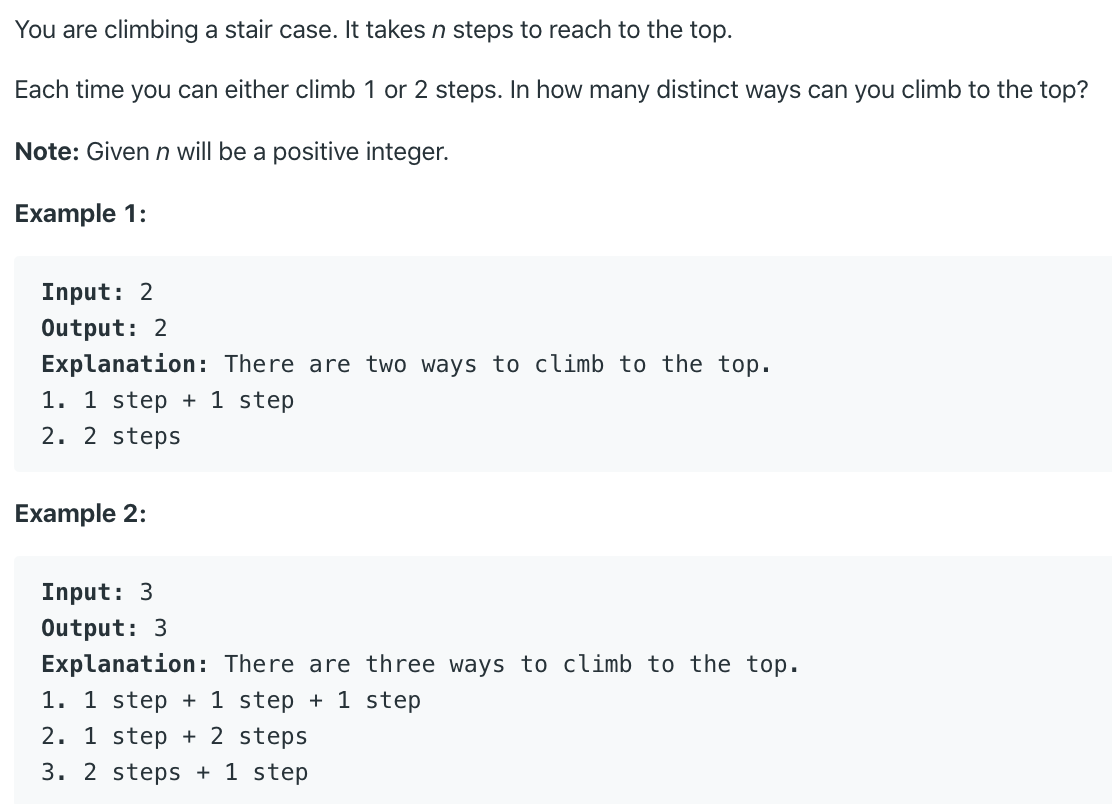Climbing Stairs

# Solution
First we need to realize that "each time you can climb 1 or 2 steps" means the result is the sum of ways of the previous two steps.
Brute-force approach would be to recurse by reducing cs[n] to cs[n-1] + cs[n-2].
This problem is then equivalent to finding -th fibonacci number.
# Recursive DP w/ Memoization
memo corresponds to Fibonacci series:
Complexity
time:
space:
def climbStairs(self, n: int) -> int:
def cs(i: int, memo) -> int:
if memo[i] > 0: return memo[i]
else:
memo[i] = cs(i-1, memo) + cs(i-2, memo)
return memo[i]
memo = [0 for _ in range(n+1)]
memo[0] = memo[1] = 1
return cs(n, memo)
2
3
4
5
6
7
8
9
10
11
# Iterative DP w/ Memoization
Complexity
time:
space:
Initialize arr to calculate current value based on the sum of previous two, stepwise towards n.
def climbStairs(self, n: int) -> int:
# use an int array to store previous steps
arr = []
arr.append(1)
arr.append(1)
for i in range(2, n+1):
arr.append(arr[i-1] + arr[i-2])
return arr[n]
2
3
4
5
6
7
8
# Fibonacci Number
Complexity
time:
space:
Then we realize we don't need any values except the previous two, so just keep a and b.
This is basically calculating the -th Fibonacci number.
def climbStairs(self, n: int) -> int:
if n == 1: return 1
a, b = 1, 1
for i in range(2,n):
a, b = b, a+b
return a + b
2
3
4
5
6
# Matrix Multiplication
As , we can deduce the state transition between , and , :
so we can use matrix multiplication to calculate the -th Fibonacci number in log time:
Complexity
time:
space:
def climbStairs(self, n: int) -> int:
def pow(a:List[List[int]], n: int) -> int:
"""Return matrix `a` to the `n`"""
ret = [[1, 0], [0, 1]]
while n > 0:
if (n & 1) == 1:
ret = multiply(ret, a)
n >>= 1
a = multiply(a, a)
return ret
def multiply(a:List[List[int]], b:List[List[int]]) -> List[List[int]]:
"""Return the multiplied matrix of `a` and `b`."""
c = [[0, 0], [0, 0]]
for i in range(2):
for j in range(2):
c[i][j] = a[i][0] * b[0][j] + a[i][1] * b[1][j]
return c
A = [[1, 1], [1, 0]]
return pow(A,n)[0][0]
2
3
4
5
6
7
8
9
10
11
12
13
14
15
16
17
18
19
20
21
# Golden Ratio
Using Fibonacci formula involving golden ratio is not recommended as the math formula is hard to remember or deduce.
Then take the int part of this floating number.
Complexity
time: (due to pow method)
space:
def climbStairs(self, n: int) -> int:
sqrt5 = math.sqrt(5)
fib_n = pow((1+sqrt5)/2, n+1) - pow((1-sqrt5)/2, n+1)
return int(fib_n/sqrt5)
2
3
4